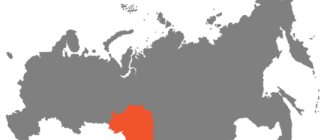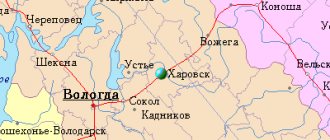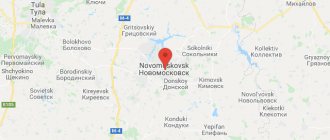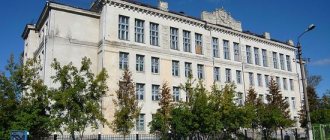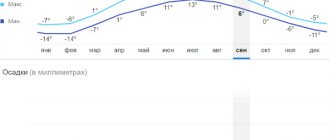| Coat of arms of Pokrovsk (Yakutia) | |
| A country | Russia |
| Subject of the federation | Yakutia |
| Ulus | Khangalassky |
| urban settlement | City of Pokrovsk |
| Vehicle code | 14 |
| OKATO code | 98 420 |
| Coordinates | Coordinates: 61°29′00″ N. w. 129°09′00″ E. d. / 61.483333° s. w. 129.15° E. d. (G) (O) (I)61°29′00″ n. w. 129°09′00″ E. d. / 61.483333° s. w. 129.15° E. d. (G) (O) (I) |
| Official language | Russian |
| Timezone | UTC+10 |
| Climate type | sharply continental |
| Center height | 90 m |
| Telephone code | +7 41144 |
| Postcode | 678000 |
| Based | 1682 |
| City with | 1997 |
| In the encyclopedia “My City” | Pokrovsk |
| Head of Administration | Nikolay Adosovich Vesvalo |
| Population | ▲ 10,223 people (2010) |
Pokrovsk (Yakut. Pokrovskaya) is a city, the administrative center of the Khangalassky ulus, in central Yakutia.
Population - 10.2 thousand people (2010).
A city on the left bank of the Lena, 78 km southwest of Yakutsk.
Economy
Transport
Connected by an asphalt road with Yakutsk (route R-501). City public transport - bus. There are suburban and intercity bus services to Yakutsk. River pier. Ferry crossing across the river. Lenu “Mokhsogolloh—Kachikatsy.”
Industry
The city has a building materials plant, an asphalt bitumen plant, a plant for the production of basalt products, and a glass plant is under construction.
Forestry A fur farm engaged in breeding silver-black foxes and sable. Compound feed plant.
Culture, science, education
- There are 4 secondary schools in the city, there are music, choreography and art schools
- There is a local history museum named after. G. V. Ksenofontov and the house-museum of G. K. Ordzhonikidze (Sergo Ordzhonikidze)
- An Orthodox church was built for the 325th anniversary in 2007.
- Experimental production farm "Pokrovskoye" of the Yakut Scientific Research Institute of Agriculture.
- Near the city in the village of Oktyomtsy - a branch of the Yakut State Agricultural Academy
- Yakut complex EAS installation of the Institute of Cosmophysical Research and Aeronomy named after. Yu. G. Shafer.
- A male warrior from Pokrovsky burial 2 of the Early Iron Age of Yakutia (2400-2200 years ago) was found to have mitochondrial haplogroup D[18].
Story
The year of foundation is considered to be 1682, in which the last uprising of the Khangalas Yakuts against the Cossacks took place. After the defeat of the rebels on October 1 (11), on Pokrov Day, the troops of the governor Ivan Priklonsky installed a large wooden cross, called Pokrovsky, on a high guard cape (Yakut. Khoruol tumua).
In 1703, part of the hermits of the Spassky Monastery from Yakutsk moved to a new place and founded a unique branch of the monastery, called the Intercession Hermitage. In 1724 the hermitage burned down. Several families of Russian peasants settled in its place.
The settlement then became a coachman's station on the Lena highway. In 1870, a second church was built in Pokrovsk, which gave it the status of a village.
In 1931, Pokrovsk became the administrative center of the West Kangalassky district, which was then renamed Ordzhonikidze, now Khangalassky. In 1941 it received the status of an urban-type settlement.
On September 26, 1997, it was given city status.
In 1916-1917 Sergo Ordzhonikidze served his exile here.
Links[edit]
Notes[edit]
- ^ abcdefghi Register of administrative-territorial units of the Republic of Sakha
- ^ abc Federal State Statistics Service (2011). “All-Russian Population Census 2010. Volume 1" [All-Russian Population Census 2010, vol. 1]. All-Russian Population Census 2010 [All-Russian Population Census 2010]
. Federal State Statistics Service. - "26. The size of the permanent population of the Russian Federation by municipalities as of January 1, 2021". Federal State Statistics Service. Retrieved January 23, 2021.
- ^ abcd Law No. 173-Z No. 353-III
- Law No. 172-Z No. 351-III
- "On the Calculation of Time". Official Internet portal of legal information
. June 3, 2011. Retrieved January 19, 2021. - Post office. Information and computing center of OASU RPO. ( Post office
).
Search for postal service objects ( postal Search for objects
) (in Russian) - ↑
Federal State Statistics Service of Russia (May 21, 2004).
“The population of Russia, the constituent entities of the Russian Federation as part of federal districts, urban settlements, settlements, settlements of 3 thousand or more people” [Population of Russia, its federal districts, federal districts, districts, urban settlements, rural settlements - administrative centers and rural settlements with a population of more than 3,000 people] (XLS). All-Russian Population Census 2002
. - “All-Union Population Census of 1989. The current population of union and autonomous republics, autonomous regions and districts, territories, effects, urban settlements and rural district centers” [All-Union Population Census of 1989: current population of union and autonomous republics, Autonomous regions and districts, territories, regions, districts, urban settlements and villages performing the functions of district administrative centers. All-Union Population Census of 1989 [All-Union Population Census of 1989]
.
Institute of Demography of the National Research University: Higher School of Economics [Institute of Demography of the National Research University: Higher School of Economics]. 1989 - via Demoscope Weekly
. - “All-Union Population Census of 1979. National composition of the population by regions of Russia” [All-Union Population Census of 1979. Ethnic composition of the population by regions of Russia] (XLS). All-Union Population Census of 1979 [All-Union Population Census of 1979]
.
1979 - via Demoscope Weekly
(website of the Institute of Demography of the State University - Higher School of Economics.
Climate
The climate of Pokrovsk, like Yakutsk, is distinguished by a very high degree of continentality. Summers are warm, often hot, but short, and winters are very long and harsh. In winter, temperatures can drop to 60 °C; in summer, temperatures above +35 °C are sometimes possible.
| Climate of Pokrovsk | |||||||||||||
| Index | Jan | Feb | Mar | Apr | May | Jun | Jul | Aug | Sep | Oct | But I | Dec | Year |
| Average temperature, °C | 39,7 | 33,7 | 21,1 | 5,4 | 6,7 | 15,2 | 18,6 | 14,4 | 5,7 | 8,1 | 27,2 | 38,1 | 9,3 |
Add a comment
Comment
Send
Excerpt characterizing Pokrovsk (Yakutia)
- From what? – Natasha asked, looking carefully into Pierre’s eyes. - How why? - said Princess Marya. - Just a thought about what awaits there... Natasha, without listening to Princess Marya, again looked questioningly at Pierre. “And because,” Pierre continued, “only that person who believes that there is a God who controls us can endure such a loss as hers and ... yours,” said Pierre. Natasha opened her mouth, wanting to say something, but suddenly stopped. Pierre hastened to turn away from her and turned again to Princess Marya with a question about the last days of his friend’s life. Pierre's embarrassment had now almost disappeared; but at the same time he felt that all his former freedom had disappeared. He felt that over his every word and action there was now a judge, a court that was dearer to him than the court of all people in the world. He spoke now and, along with his words, reflected on the impression that his words made on Natasha. He did not deliberately say anything that might please her; but, no matter what he said, he judged himself from her point of view. Princess Marya reluctantly, as always happens, began to talk about the situation in which she found Prince Andrei. But Pierre's questions, his animatedly restless gaze, his face trembling with excitement little by little forced her to go into details that she was afraid to recreate for herself in her imagination. “Yes, yes, so, so...” said Pierre, bending forward with his whole body over Princess Marya and eagerly listening to her story. - Yes Yes; so has he calmed down? softened? He always sought one thing with all the strength of his soul; be quite good that he could not be afraid of death. The shortcomings that were in him - if there were any - did not come from him. So has he relented? - said Pierre. “What a blessing that he met you,” he said to Natasha, suddenly turning to her and looking at her with eyes full of tears. Natasha's face trembled. She frowned and lowered her eyes for a moment. She hesitated for a minute: to speak or not to speak? “Yes, it was happiness,” she said in a quiet chesty voice, “for me it was probably happiness.” – She paused. “And he... he... he said that he wanted this, the minute I came to him...” Natasha’s voice broke off. She blushed, clasped her hands on her knees and suddenly, apparently making an effort on herself, raised her head and quickly began to say: “We didn’t know anything when we drove from Moscow.” I didn't dare ask about him. And suddenly Sonya told me that he was with us. I didn’t think anything, I couldn’t imagine what position he was in; I just needed to see him, to be with him,” she said, trembling and gasping for breath. And, not allowing herself to be interrupted, she told what she had never told anyone before: everything that she experienced in those three weeks of their journey and life in Yaroslavl. Pierre listened to her with his mouth open and without taking his eyes off her, full of tears. Listening to her, he did not think about Prince Andrei, or about death, or about what she was telling. He listened to her and only pitied her for the suffering she was now experiencing as she spoke. The princess, wincing with the desire to hold back tears, sat next to Natasha and listened for the first time to the story of these last days of love between her brother and Natasha. This painful and joyful story was apparently necessary for Natasha. She spoke, mixing the most insignificant details with the most intimate secrets, and it seemed that she could never finish. She repeated the same thing several times. Behind the door, Desalles' voice was heard asking if Nikolushka could come in to say goodbye. “Yes, that’s all, that’s all...” said Natasha. She quickly stood up just as Nikolushka was entering, and almost ran to the door, hit her head on the door covered with a curtain, and with a groan of either pain or sadness burst out of the room. Pierre looked at the door through which she went out and did not understand why he was suddenly left alone in the whole world. Princess Marya called him out of his absent-mindedness, drawing his attention to his nephew, who entered the room. Nikolushka’s face, similar to his father, in the moment of spiritual softening in which Pierre was now, had such an effect on him that he, having kissed Nikolushka, hastily stood up and, taking out a handkerchief, went to the window. He wanted to say goodbye to Princess Marya, but she held him back. – No, Natasha and I sometimes don’t sleep until three o’clock; please sit. I'll give you dinner. Go down; we'll be there now. Before Pierre left, the princess told him: “This is the first time she spoke about him like that.” Pierre was led into the large, illuminated dining room; a few minutes later steps were heard, and the princess and Natasha entered the room. Natasha was calm, although a stern, without a smile, expression was now again established on her face. Princess Marya, Natasha and Pierre equally experienced that feeling of awkwardness that usually follows the end of a serious and intimate conversation. It is impossible to continue the same conversation; It’s shameful to talk about trifles, but it’s unpleasant to remain silent, because you want to talk, but with this silence you seem to be pretending. They silently approached the table. The waiters pushed back and pulled up chairs. Pierre unfolded the cold napkin and, deciding to break the silence, looked at Natasha and Princess Marya. Both, obviously, at the same time decided to do the same: contentment with life and recognition that, in addition to grief, there are also joys, shone in their eyes. - Do you drink vodka, Count? - said Princess Marya, and these words suddenly dispersed the shadows of the past. “Tell me about yourself,” said Princess Marya. “They tell such incredible miracles about you.” “Yes,” Pierre answered with his now familiar smile of gentle mockery. “They even tell me about such miracles as I have never seen in my dreams.” Marya Abramovna invited me to her place and kept telling me what had happened to me, or was about to happen. Stepan Stepanych also taught me how to tell things. In general, I noticed that it is very peaceful to be an interesting person (I am an interesting person now); they call me and they tell me. Natasha smiled and wanted to say something. “We were told,” Princess Marya interrupted her, “that you lost two million in Moscow.” Is this true? “And I became three times richer,” said Pierre. Pierre, despite the fact that his wife’s debts and the need for buildings changed his affairs, continued to say that he had become three times richer. “What I have undoubtedly won,” he said, “is freedom...” he began seriously; but decided against continuing, noticing that this was too selfish a subject of conversation. -Are you building? - Yes, Savelich orders. – Tell me, did you not know about the death of the Countess when you stayed in Moscow? - said Princess Marya and immediately blushed, noticing that by making this question after his words that he was free, she ascribed to his words a meaning that they, perhaps, did not have. “No,” answered Pierre, obviously not finding the interpretation that Princess Marya gave to his mention of her freedom awkward. “I learned this in Orel, and you can’t imagine how it struck me.” We were not exemplary spouses,” he said quickly, looking at Natasha and noticing in her face the curiosity about how he would respond to his wife. “But this death struck me terribly.” When two people quarrel, both are always to blame. And one’s own guilt suddenly becomes terribly heavy in front of a person who no longer exists. And then such death... without friends, without consolation. “I’m very, very sorry for her,” he finished and was pleased to notice the joyful approval on Natasha’s face. “Yes, here you are again, a bachelor and a groom,” said Princess Marya. Pierre suddenly blushed crimson and tried for a long time not to look at Natasha. When he decided to look at her, her face was cold, stern and even contemptuous, as it seemed to him. – But did you really see and talk with Napoleon, as we were told? - said Princess Marya. Pierre laughed. - Never, never. It always seems to everyone that being a prisoner means being a guest of Napoleon. Not only have I not seen him, but I have also not heard of him. I was in much worse company. Dinner ended, and Pierre, who at first refused to talk about his captivity, gradually became involved in this story. - But is it true that you stayed to kill Napoleon? – Natasha asked him, smiling slightly. “I guessed it when we met you at the Sukharev Tower; remember? Pierre admitted that this was the truth, and from this question, gradually guided by the questions of Princess Marya and especially Natasha, he became involved in a detailed story about his adventures. At first he spoke with that mocking, meek look that he now had at people and especially at himself; but then, when he came to the story of the horrors and suffering that he had seen, he, without noticing it, became carried away and began to speak with the restrained excitement of a person experiencing strong impressions in his memory. Princess Marya looked at Pierre and Natasha with a gentle smile. In this whole story she saw only Pierre and his kindness. Natasha, leaning on her arm, with a constantly changing expression on her face, along with the story, watched, without looking away for a minute, Pierre, apparently experiencing with him what he was telling. Not only her look, but the exclamations and short questions she made showed Pierre that from what he was telling, she understood exactly what he wanted to convey. It was clear that she understood not only what he was saying, but also what he would like and could not express in words. Pierre told about his episode with a child and a woman, for whose protection he was taken, in the following way: “It was a terrible sight, children were abandoned, some were on fire... In front of me they pulled out a child... women, from whom they pulled things off, tore out earrings... Pierre blushed and hesitated. “Then a patrol arrived, and all those who were not robbed, all the men were taken away. And me. – You probably don’t tell everything; “You must have done something…” Natasha said and paused, “good.” Pierre continued to talk further. When he talked about the execution, he wanted to avoid the terrible details; but Natasha demanded that he not miss anything. Pierre started to talk about Karataev (he had already gotten up from the table and was walking around, Natasha was watching him with her eyes) and stopped.

